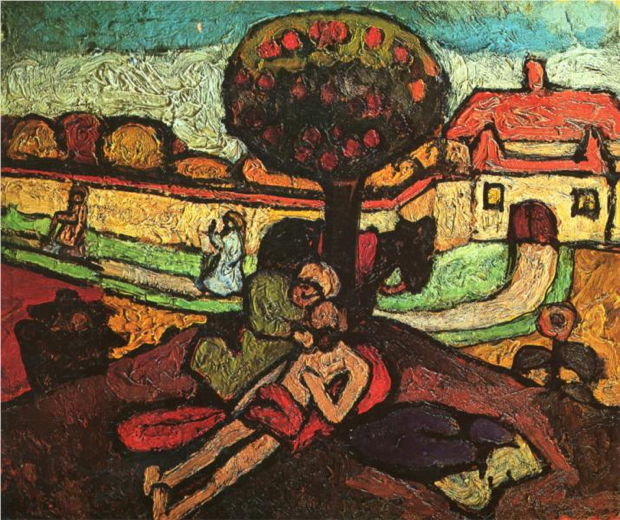
art credit: Paula Modersohn-Becker
Last week, my neighbor needed a neighbor but I was too busy to be one. She’s dealing with some harrowing systemic injustices at work and needed someone to lament with her, walk alongside her, and advocate for her. She reached out to me, but I didn’t reach back. After spending years building cross-cultural trust with my neighbor, I squandered the opportunity to be incarnational, to back my words and intentions up with deeds. Bogged down with commitments, tethered to my own social agenda, and blinded by busyness, I hadn’t created space to engage in the second greatest commandment: to love my neighbor.
This can happen so easily — even (dare I say, especially?) to those of us who claim reconciliation as one of our most important values! One classic study1 found that when people are in a hurry, they are less likely to stop to help people in need. Back in the ‘70s, Princeton social psychologists John Darley and Daniel Batson recruited Princeton seminary students to participate in their study on “religious education.”
For the first part of the experiment, each seminary student was asked to complete various demographic questionnaires. Once completed, each participant was told that he needed to walk to another building on the other side of campus to complete the second task of the experiment — which was to give a sermon on the Good Samaritan story. Half of the participants were told that the study was behind schedule and that they needed to hurry across campus as quickly as possible to give their Good Samaritan sermon to the waiting audience. The other half of the participants weren’t told anything about being behind schedule or the need to hurry across campus.
En route to the other side of campus, each participant walked by a man slumped in an alleyway. The man, who had been planted there by the researchers, moaned and coughed twice when each participant walked by. The researchers measured how many participants stopped to be a good Samaritan as they walked across campus to give a Good Samaritan sermon.
Darley and Batson found that 63% of the participants who were not in a hurry stopped to help the man. However,only 10% of the participants who were in a hurry stopped to help the man — even though they were on their way to give a sermon about helping people!
I can relate to these seminary guys. I mean, they were busy doing a good thing — preaching a sermon on helping people! Kingdom work! Of cosmic importance! But in the midst of their busyness for good, they became insensitive to the bad around them.
Me and those Princeton seminary students need to slow down in order to love well.
We hear this message of “slowing down” a lot when it comes to our relationship with God. In the past month alone, I’ve heard three different sermons on Mary vs. Martha. There’s a good reason for this! Ruth Haley Barton writes a lot about how American Christian leaders desperately need to make space in their hectic schedules for significant periods of rest and solitude with God.
I’m terrible at doing this. I’m a “doer”; I was born busy; I rarely sleep — and even when I do sleep, I find that my dreams are merely subconscious critical thinking exercises that ultimately rouse me from my sleep. But Barton urges crazy-busy people like me to be intentional about resting and spending prolonged time with God because without that time, we will lose ourselves.
Following her advice, I’ve learned to consistently set aside Sabbath time each week. On Thursdays, I take a me/God day, complete with a digital detox. (I am 100% unreachable and my soul loves me for it). I do this because it helps me stay connected to God; it helps me live out the first commandment: to love God.
But if a crazy-busy person like me needs to intentionally set aside time to connect with God in service of the first commandment, then I also need to intentionally set aside time to connect with my neighbors in service of the second commandment. To simply be, to simply listen, to simply follow their agenda, to unplug from the trappings of privilege, to be reminded that there’s cosmic importance in sitting in a living room for an evening and listening to problems that are nothing like my own.
Henri Nouwen’s thoughts on “ministry of presence” sum it up so well:
More and more, the desire grows in me simply to walk around, greet people, enter their homes, sit on their doorsteps, play ball, throw water, and be known as someone who wants to live with them. It is a privilege to have the time to practice this simple ministry of presence. Still, it is not as simple as it seems. My own desire to be useful, to do something significant, or to be part of some impressive project is so strong that soon my time is taken up by meetings, conferences, study groups, and workshops that prevent me from walking the streets. It is difficult not to have plans, not to organize people around an urgent cause, and not to feel that you are working directly for social progress. But I wonder more and more if the first thing shouldn’t be to know people by name, to eat and drink with them, to listen to their stories and tell your own, and to let them know with words, handshakes, and hugs that you do not simply like them, but truly love them.2
Selah.
Footnotes:
1. Darley, J. M., and Batson, C.D. (1973). “From Jerusalem to Jericho”: A study of situational and dispositional variables in helping behavior”. Journal of Personality and Social Psychology, 27, 100-108.
2. Henri Nouwen, Gracias! (New York: Harper Collins, 1983), 147-48